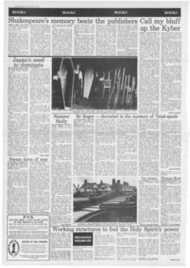Page 2, 16th January 1987
Page 2

Report an error
Noticed an error on this page?If you've noticed an error in this article please click here to report it.
Tags
Share
Related articles
Nicaraguan Priests In Talks Over Political Jobs Loss
Priest Attacks Us Over Clamp On Aid For Nicaragua
Nuts And Bolts Of Nicaragua
Blood Of Nicaragua's Innocents
Healing Of Rift 'not In Immediate Future'
Pluralist roots laid in Nicaragua
NICARAGUA is often damned as "totalitarian" by its detractors. One man uniquely well placed to dispell such lies is Fr Alvaro Arguello, the Jesuit who has spent the last four years heading a special committee to draw up the ground rules for a pluralist political system in the Central American country.
Fr Alvaro, who is in London this week for a conference on Central America organised by the Catholic Institute for International Relations*, has seen his work, come to fruition in Nicaragua's National Assembly with its seven elected parties.
Yet such achievements rarely make headlines. Instead Fr Alvaro reads that the Church in Nicaragua is "oppressed", that free speech is "stiffled", that the Sandinistas are a band of fanatical "Marxist-Leninist" revolutionaries. "I look round and think that this is not my country they are describing".
He recalls an incident in 1981 when the US Secretary of State, Alexander Haig, called in Washington's press corps and demanded to know why they did not cover Sandinista mistreatment of Miskito Indians. He presented the press with a photograph of "Sandinista troops burning Miskitos alive". The photo was duly published and captioned.
A week later the Nicaraguan government uncovered that it was in fact a 1972 picture of Red Cross workers burning the corpses of victims of the Managua earthquake. An apology was printed. "But by that time, the damage had been done", Fr Alvaro says. (He would not, however, deny that mistakes have been made in treatment of the Miskitos—but feels that these are now being rectified.) Fr Alvaro regards the propoganda onslaught against Nicaragua with sadness. 'They say that children and crazy men tell the truth. Those who comment negatively about Nicaragua either do not know Nicaragua—they have not been there—or they allow themselves to be carried along by idealogical biases in a very emotional way—or maybe both". Ronald Reagan, with his rhetoric about "founding fathers" and the "contras" falls into both camps. "Reagan thinks he knows the truth—God !blinds those who do not want to see".
Fr Alvaro's field of expertise is in international relations. With the support of his Jesuit Superior-General he is Director of the Intertnational Relations
Department of the National Assembly. He is thus an adviser and an official of the government, but not a Sandinista party member.
In the international sphere he claims victories for Nicaragua—the International Court of Justice ruling that the US was breaking international law in its campaign of support for the "contras", the US bishops statement that Reagan was violating Christian values, the support of the Contadora group of eight Latin American countries.
Nicaragua has now been elected as a member of the UN security council in spite of US opposition. It has been given important posts in the nonaligned movement, and hopes soon to host a meeting of the Inter-Parliamentary Union—"peaceful, political diplomacy" is the way to peace, he says.
He feels that the Vatican is slowly coming to see that the violently anti-Sandinista view of Cardinal Obando Bravo of Managua is not a way forward. "The Vatican did not understand Nicaragua. But now there is a change in its appreciation and its view on the reversibility of the Nicaraguan revolution. It seems now that they want to get along with Nicaragua". Fr Alvaro quotes the role of the new nuncio in Managua in fostering contacts and dialogue between churchl and state, and sees the cardinal as increasingly out of step with Rome.
Chur chand international/diplomatic support for Nicaragua in its battle with Ronald Reagan are just two "trenches" for the country to fight in according to Fr Alvaro. On a more basic level, the Sandinistas must defend their country, must satisfy the basic needs of the people—in health care, education, food and so on—and must create an open, pluralist society.
Fr Alvaro would not deny that some elements in the ruling party are "Marxist-Leninist", but they are just a faction and are balanced by many other groups he stresses.
"Patience is a revolutionary virtue", Fr Alvaro emphasises. With patience and his careful diplomacy the Christian and just aims of the 1979 revolution in Nicaragua may be achieved—and that is what Mr Reagan fears above all.
*A full report on the CIIR conference will be published next week.
blog comments powered by Disqus











